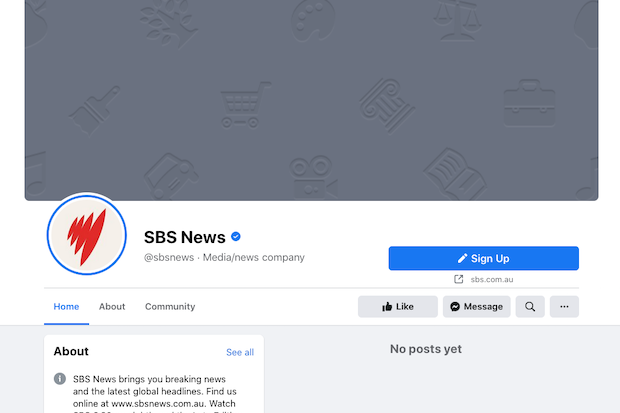
Facebook users cannot currently share links from news pages in Australia
Since yesterday, Facebook has restricted Australians from viewing and sharing news on its platform in response to the country's proposed news media bargaining code. This ban is an escalation of already heated talks between the government and the big tech about paying publishers for news content.
The decision came as Australia is preparing for covid vaccine rollout announced next week (22 February), leaving millions of users without reliable news sources to counter hoaxes and misinformation spreading on the platform.
"It was totally unexpected," one digital lead at Special Broadcasting Service (SBS Australia) told Journalism.co.uk.
"I checked my emails about 6:30 am and that is where I saw it. It caught us completely off guard, we weren’t prepared."
After the team first learned about the ban from Reuters, they saw the full extent of the crisis around 10 am local time when Facebook released a statement.
"We had to start to think what to say to our audiences," she says, "while trying to calm down our 200+ journalists."
For SBS News, which provides communities with news in 63 languages, Facebook was an important driver of traffic. Overall, 56 per cent of its website traffic came from its page 'liked' by 1.6 million people, while for SBS Arabic24, this figure jumped to 86 per cent.
"I am very concerned that the communities and older generations who follow us on Facebook won't get news. This is how they get their information. They don't search us on Google, they open Facebook directly."

As a consequence of the Facebook news ban, the SBS News Facebook page has been wiped clean. It shows no posts, images, not even a banner that contained a news picture. All the team could do was to add a 'Sign Up' button to redirect users to their website, update the About page, and reply to a flurry of direct messages from concerned readers. The users who were subscribed to the Messenger bot have received a message saying what was happening but others were left in the dark.
Once that message was out, the team sent out a newsletter to inform its readers about what was happening and to point them towards the broadcaster's website. Next, they created an article with all the information about where to find them, followed by radio announcements.
Throughout the day, journalists added a message about where to find SBS News content to every article published on the website, regardless of the topic. The broadcaster also added a banner on its website with the same message.
The task got tougher with channels that broadcast in different languages. From the 63 languages, only Arabic and Chinese have dedicated newsletters while other communities relied on Facebook to get their news. This prompted the broadcaster to create a newsletter for each channel.
For us, it’s a big wakeup call to stop relying on Facebook.
"We created a video explainer about vaccines and we will try to post it as a Facebook advert rather than news to see whether the audience will get it," says the SBS News journalist, who is determined to get scientifically-backed information to the public at such a crucial time.
"For us, it’s a big wakeup call to stop relying on Facebook. We want to build more direct relationships with our audience and try different social media."
But creating new social accounts will take time and cost money, putting additional strain on the news teams. Today, those in social media roles were also worried about losing their jobs, although there were no redundancies announced yet.
It is a different story for marketing agencies who run Facebook campaigns for the broadcaster and who will now find themselves without commissions.
"We’ve been working with the platform for so long and this felt like being bullied. They could have at least given us a warning."
Want to receive journalism news and job updates straight to your phone? Subscribe to Journalism.co.uk on Telegram on our jobs channel for latest job opportunities and our news channel for a weekly digest every Monday morning.
Free daily newsletter
If you like our news and feature articles, you can sign up to receive our free daily (Mon-Fri) email newsletter (mobile friendly).
Related articles
- Journalists are happy to be disconnecting from platforms, should news organisations be worried?
- Protecting journalists on social media, with Valérie Bélair-Gagnon
- How NRK uses AI-generated summaries to boost younger readers’ engagement
- Why Australia's bid to make big tech pay for news failed: views from an indie publisher
- What will your audience want in the future?









